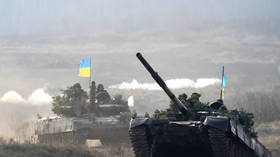Biden tells Ukrainian president what US will do if Russia invades

US President Joe Biden has assured his Ukrainian counterpart, Volodymyr Zelensky, that Washington and its allies will “respond decisively” in the event that Moscow invades its neighbor.
The two leaders spoke by phone on Sunday, with the White House later releasing a statement. Apart from the usual comments about America’s commitment to Ukraine’s “sovereignty and territorial integrity,” Biden also told Zelensky that Washington would not be discussing any matters that would directly affect Kiev behind its back, saying “nothing about you without you” was a key principle in bilateral relations.
On top of that, the US president hailed “confidence-building measures to de-escalate tensions in Donbas” as well as “active diplomacy to advance the implementation of the Minsk Agreements, in support of the Normandy Format.”
According to the White House, the “leaders expressed support for diplomatic efforts, starting next week with the bilateral Strategic Stability Dialogue, at NATO through the NATO-Russia Council, and at the Organization for Security and Cooperation in Europe [OPEC].”
Next Monday, Russia and the US will hold talks on security guarantees in Geneva, Switzerland, followed by a meeting of the NATO-Russia Council in Brussels, Belgium on January 12, and a session of the OSCE Permanent Council in Vienna, Austria on January 13.
After Sunday’s phone call, Zelensky took to Twitter, stressing that his conversation with Biden was the “first international talk of the year,” which proved the “special nature of our relations.” The Ukrainian president’s tweet also said “keeping peace in Europe, preventing further escalation, reforms [and] deoligarchization” were the key topics discussed. He concluded by thanking Ukraine’s "allies" for their “unwavering support.”
Biden’s talk with Zelensky came on the heels of his phone call with Russian President Vladimir Putin on December 30. Biden warned his Russian counterpart about sweeping sanctions against Russia should it invade Ukraine, even though Moscow has consistently denied speculation about any plans in that regard. Putin, in turn, made it clear that such punitive measures would effectively mean severing relations between the two countries.
In mid-December, Russia presented a draft programme for security guarantees in Europe that it wanted to discuss with the West. Among the key points mentioned was the ending of NATO’s eastward expansion, with Moscow requesting a legally binding document that would guarantee Ukraine would not become part of the military bloc. The US and its allies rejected the proposal, but agreed to hold talks with Russia. The Kremlin warned NATO that it would have to respond proportionately if its calls were left unheeded.
The latest concerns over Ukraine have been spurred on by claims in the Western media that Russia was planning to invade Ukraine. Moscow has consistently denied having any such intentions and stressed that its troop movements were limited to Russian territory, saying it was not obliged to account for them.













